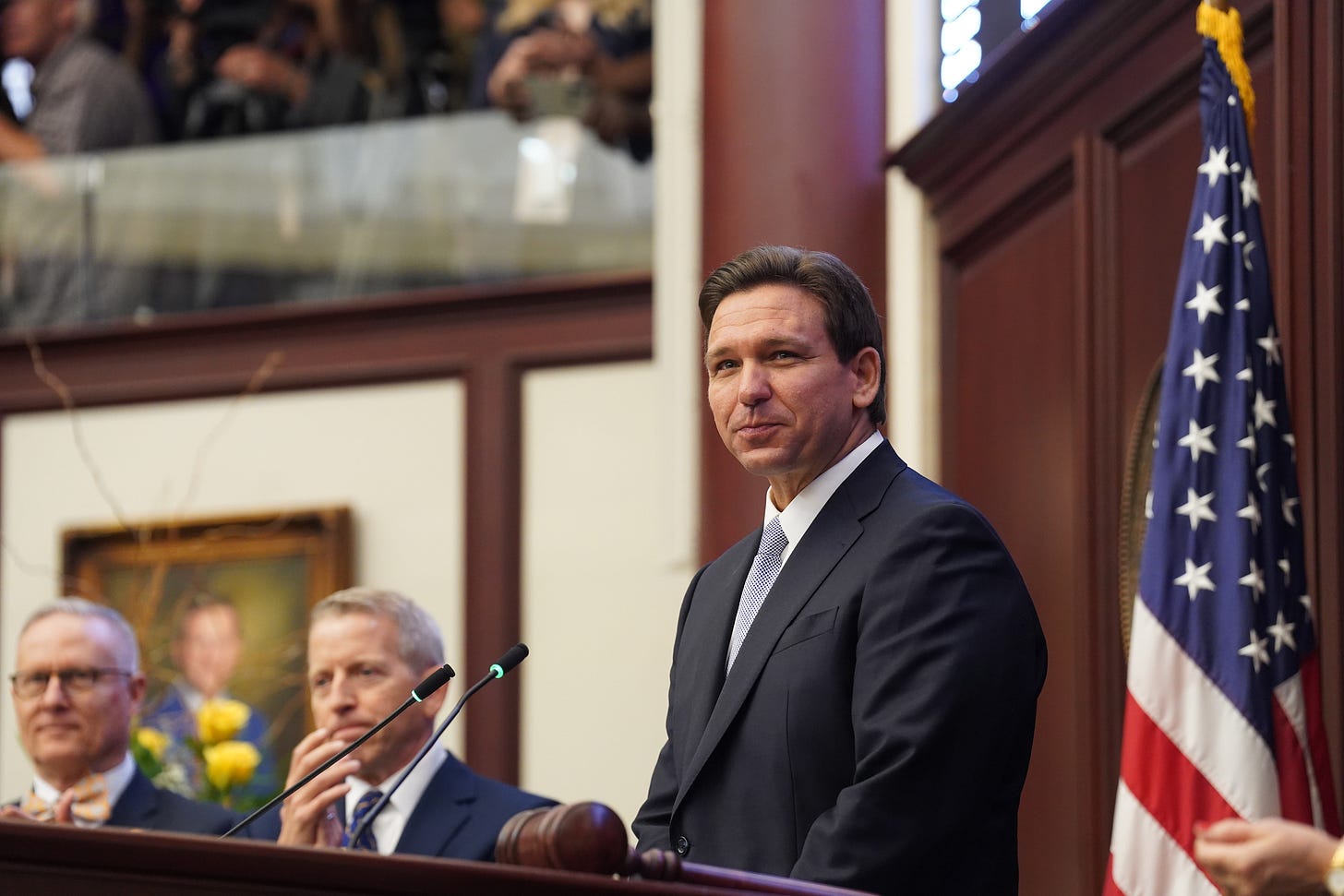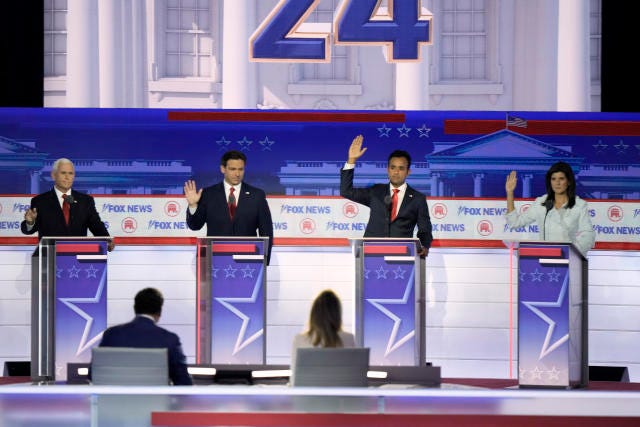Ron DeSantis is a sitting duck
DeSantis signals resistance to changing to his strategy to become President of the United States.
Governor Ron DeSantis made major moves in his campaign staff throughout July. Now that August is over, it’s clear the staff wasn’t the problem, the strategy was. Worse, DeSantis signals resistance to change his strategy to become President of the United States.

Strategic analysis frameworks like PEST, Porter’s Five Forces, SWOT, and others are tools strategists use to understand their goals and environment well enough to identify a competitive advantage and then execute on it. The pros of using structured analysis for strategic thinking include:
Mapping the competitive landscape.
Identifying opportunities to engage with customers.
Presenting clearly defined problems, and developing solutions to those problems.
A good strategist will likely use a few frameworks to develop a campaign strategy. Each framework points out different aspects of the problem space and potential solutions. Unfortunately, these frameworks don’t force a strategist to discharge their biases before sitting down to work.
The DeSantis campaign, and perhaps Ron DeSantis himself, suffers from cognitive inertia, preventing him from creating a campaign strategy that really works. Changing the people on his staff will not avail him on the campaign trail if the strategy, platform, and messaging are the same as before. The weakness of all strategic analysis frameworks is a biased and encumbered strategist. I’m not talking about an overt, or conscious bias. I’m talking about the blind spots, the biases we don’t even know we have. Ron DeSantis is a human like the rest of us. He is subject to the same frailties and fragilities as the rest of us. Cognitive inertia is one of those fragilities. Before his campaign staff can shed the action inertia, the encumbrance around doing things, DeSantis needs to shed the cognitive inertia, the encumbrance of thinking things. Cognitive inertia hides itself; strategists suffering from cognitive inertia don’t realize they suffer from cognitive inertia.
Cognitive inertia falls into three broad buckets, according to Giovanni Gavetti. They are:
emotional traps
dangerous analogies
framing lock-ins
If you’ve been paying attention to Ron DeSantis whenever he’s in front of a live mic, you know there is a lot of sand in these cognitive inertia buckets.
Starting with emotional traps, DeSantis is certain woke will destroy the world. There is no room to misinterpret his stance. At last week’s Republican Primary Debate, he says:
“I will be able to destroy leftism in this country and leave woke ideology on the dustbin of history.”
As you may recall, DeSantis insists slavery was beneficial to black people. This is approximately the most anti-woke thing one could possibly say, confirming his commitment to wipe woke ideology out of this timeline. And then you get headlines like this:
NBC News says Ron DeSantis was booed at a vigil for Jacksonville shooting victims. After saying slavery conferred benefits to black people, DeSantis had to show up at a historically black college to condemn the type of behavior his own rhetoric encourages. I hope the point is obvious. Ron DeSantis falls into the emotional trap of thinking woke ideology is the problem without questioning what impact he has on the situation. Not only his own impact, but the impact of other people like him. People such as his donors and voters.
Regarding dangerous analogies, DeSantis is a highlight reel. One of his favorites is to “start slitting throats”. He used this a couple times recently. The Hill has two of them.
“We’re going to have all of these deep state people, you know, we are going to start slitting throats on day one.” - Governor Ron DeSantis
Analogical reasoning is a powerful tool for mapping candidate solutions from a source problem to a target problem. The target problem is the problem you want to solve right now. In DeSantis’ case, the target problem is actually two problems. The twin problems of winning an election and governing a nation. Slitting throats may seem like an extremism pulled from hyperbole. However, dangerous analogies reveal the breadth of candidate solutions the strategist has available. Dangerous analogies reveal the prior experience of a strategist. Where would Governor DeSantis have pulled this analogy? From his experience in the United States Navy, where he was the legal advisor for SEAL team one. I don’t know exactly what SEAL team one does, but if it’s anything like SEAL team six, I understand where he got the analogy. I also understand DeSantis is not a SEAL, he was in JAG.
The problem is that winning an election and governing a nation aren’t fundamentally like the problems that can be solved by “slitting throats on day one” in the Navy. The analogy is dangerous because he’s not solving the same problem. In fact, slitting throats is probably the last thing that should come out of his mouth. DeSantis using this analogy shows that he can’t yet comprehend or articulate the two problems he faces right now. He reveals a limited breadth of experience in solving a wide range of problems. This is where a good strategist collaborates with others to eliminate the blind spots. A good strategist works on ideas with others to make sure other perspectives are included and aligned.
It’s hard to be a successful strategist though, when all strategists are susceptible to framing lock-in. This is Ron DeSantis to a tee. He is trying to out-Trump Donald J. Trump and failing in every way. Trump voters don’t want a more extreme, less fun Trump, but who raised his hand when asked if he would support Trump should Trump become the GOP POTUS nominee?
There he is. DeSantis doesn’t know how to position himself in the entire campaign, and struggles still in showing support for Trump. Why Trump? Why keep supporting the person he’s trying to unseat? DeSantis can differentiate himself from the pack by developing a strategy that resonates with voters and donors alike, or he can keep ignoring the elephant in the room. Though he changed key staff members on his campaign, the mindset is the same. There has been no evolution or change in messaging since he replaced Generra Peck as campaign manager. Peck is now a strategist on the campaign, but who knows for how long.
DeSantis needs to shake free of the Trump sphere of influence, and bring a staggeringly large block of voters and donors with him. The way to do that is not through strict adherence to destroying every bit of wokeism in the nation. He needs to change his mindset and tune in to what people are thinking about. Just in the state of Florida, he picked a fight with the state’s largest employer over treating their employees with dignity and respect. The Florida insurance industry is in crisis as insurance companies flee his state. And the recent incident mentioned above where DeSantis had to show his face in front of black people after saying slavery was beneficial to slaves once again shows no change in strategy.
Framing lock-ins are illusions held by the strategist. Those illusions resist negative feedback like what I wrote above. Negative feedback runs against the cognitive inertia in place. Preservation of the illusion is too important for the strategist to question, so unsatisfying outcomes are attributed to other causes, such as a poorly performing campaign manager, or a bad press photo, rather than the true underlying cause. Ron DeSantis is deep in a framing lock-in and he does not have people around him capable of pulling him out. Rather, they look for continued hints that his campaign is gaining momentum. According to RealClearPolitics 2024 Republican Presidential Nomination polling data, the campaign is not gaining momentum. In fact, DeSantis is polling lower this week than last.
There are remedies for these cognitive inertia. I’ll cover those in the coming weeks.
I don’t mean to pick on Governor Ron DeSantis. I write these articles because I expect better of a man with his background, education, work ethic, and service to our country. Some day Ron DeSantis may be President of the United States, but it won’t be in January 2025.
What do you think? Where can Ron DeSantis improve his campaign strategy? What should he do to engage with the voters and donors more productively? Let me know in the comments!



